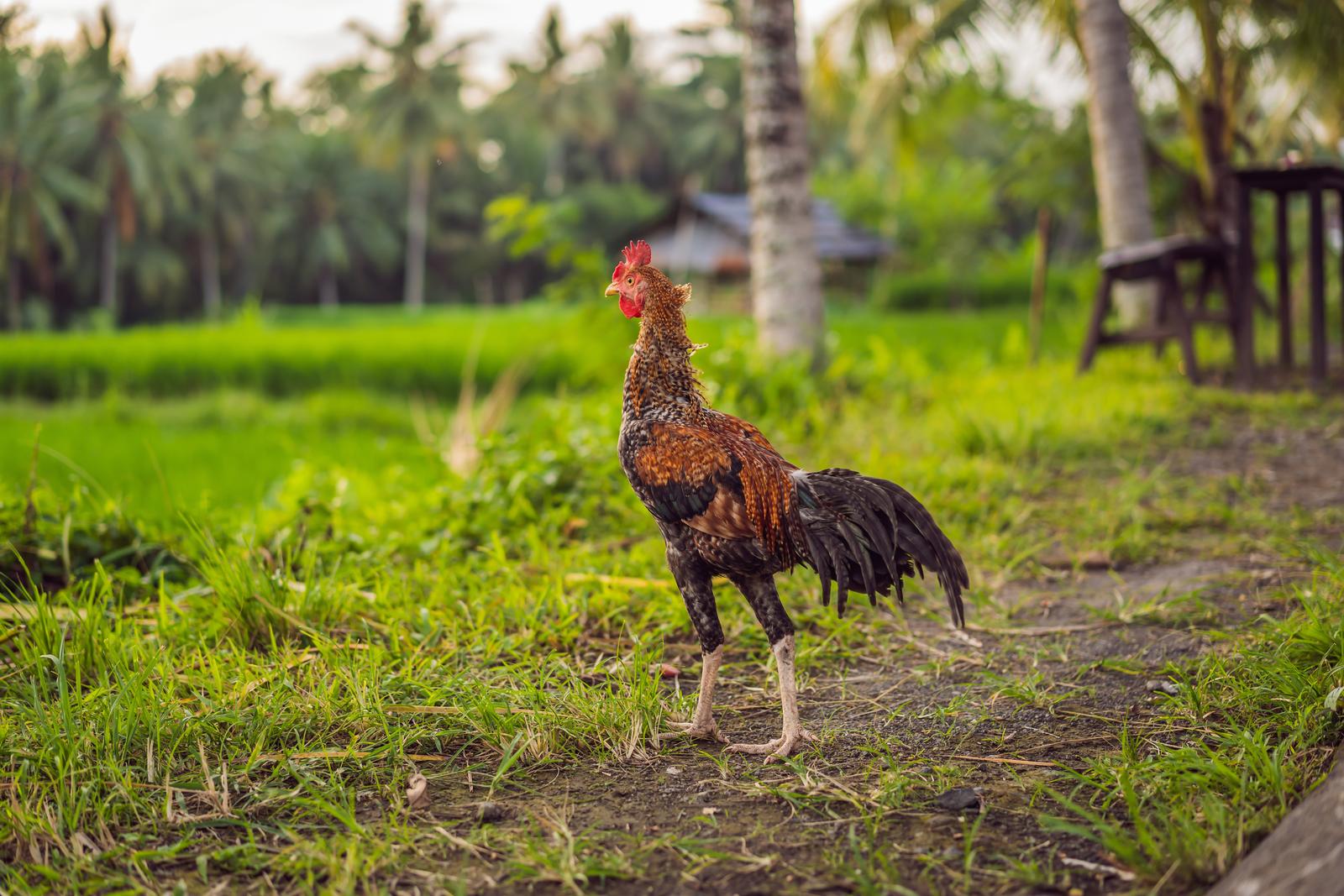Many people drawn to the idea of sustainable living, self-sufficiency, and the joy of raising their own food start their journey by keeping chickens for eggs and meat. Concerning raising chickens for eggs, many people question whether a rooster is necessary for chickens to lay eggs.
A rooster is not necessary for a flock of chickens for the hens to produce eggs. The hens will continue to produce eggs as part of their reproductive cycle, but the eggs will not be fertilized due to the absence of a rooster. Choosing a rooster-less flock or keeping a rooster each has pros and cons.
While it may seem a logical assumption that roosters are necessary for hens to lay eggs, the truth is quite different. Understanding the basics of egg production and the influence of roosters will help you make informed decisions about your flock.
Must You Keep A Rooster For Your Chickens To Lay Eggs
Understanding the role of a rooster in a flock of chickens and the biological processes whereby hens produce eggs is an important part of learning whether roosters are required for chickens to lay eggs.
This is important for many homesteaders or backyard chicken keepers, who may have local restrictions on the number of birds they can keep and whether the bylaws allow rooster keeping.
Chickens have been domesticated for centuries, and some breeds have been bred to enhance their egg-laying cycle. This allows the egg-laying breeds to be more productive and lay a larger number of eggs throughout the year than other bird types.
Will keeping a flock of egg-laying chickens without a rooster affect the egg production in the birds?
How Do Chickens Produce Eggs?
Like other birds, chickens possess a unique reproductive system that enables them to lay eggs. The mechanics of how this is achieved has a bearing on the role of the rooster in the reproduction process of chickens.
Hens have a pair of ovaries located near their kidneys. Each ovary of the chicken contains thousands of tiny follicles, which are potential egg cells. However, only a small fraction of these follicles mature into fully developed eggs.
The process of egg formation in a hen is as follows.
- Ovulation. In this process, a mature egg is released from the ovary in a hen’s reproductive cycle. This process is known as ovulation and typically occurs every 24-26 hours.
- Egg Development. Once the egg is released, it enters the oviduct—a long, winding tube where various components of the egg are formed.
- Shell Formation. In the isthmus, which takes approximately 75 minutes, the shell material is secreted around the egg. The pigmentation and shell quality are determined during this phase. The shell receives its final pigment, and the egg is laid via the cloaca.
This simplifies the process, but it gives enough information to understand how the chicken’s body produces an egg.
The egg production cycle in a hen can be likened to the menstrual cycle in humans. The process happens on a set cycle periodically as a normal bodily process, irrespective of whether a male of the species is present.
Understanding these steps helps us grasp the intricate process within a hen’s reproductive system to produce an egg. However, the big question remains—where does the rooster fit into all of this?
What Is The Role Of The Rooster In Egg Production?
There is a prevalent misconception that roosters are required for hens to lay eggs. However, the truth is that hens can lay eggs without the presence of a rooster. This is because the hen’s own hormonal system primarily drives the egg production process.
Hens naturally produce eggs as part of their reproductive cycle, regardless of whether they have mated with a rooster. The ovary releases eggs regularly, and the reproductive system carries out the process of egg formation, as previously explained.
When a rooster is absent, and the hen is unmated, all the eggs produced will be unfertilized. This means that the eggs will not produce baby chickens, but it won’t stop the hens from laying eggs. This is good for backyard chicken keepers or homesteaders that focus on producing eggs for the table.
If a hen has mated with a rooster, there is a possibility that the eggs she lays can be fertilized. Fertilization occurs when the rooster’s sperm fertilizes the egg before the shell forms.
Fertilized eggs have the potential to develop into chicks if incubated properly. However, without the specific conditions needed for incubation, the fertilized egg will not hatch.
It’s important to note that consuming fertilized eggs is safe and poses no health risks. Fertilized eggs are virtually indistinguishable from unfertilized eggs in terms of taste, appearance, and nutritional content.
Understanding these facts helps dispel the myth that a rooster is necessary for hens to lay eggs. While roosters play a crucial role in fertilization and breeding, they are not required for egg production itself.
Backyard chicken keepers and homesteaders who solely seek a steady supply of fresh eggs can maintain a rooster-free flock without sacrificing egg-laying capabilities.
Pros and Cons of Keeping Roosters
Keeping roosters in your flock can offer several advantages, but weighing the pros and cons before deciding is essential.
In some cases, you may not have a choice, as certain urban and suburban bylaws ban the keeping of roosters and even limit the number of chickens you may keep. Most of these regulations are based on the fact that roosters disturb the peace with their vocalizations and can annoy your neighbors.
In my experience, it is a fallacy that roosters only crow at sunrise. They can crow at any time of the night, sometimes at the full moon, and other times simply as a territorial vocalization.
I have often considered a roast rooster dinner after being awakened in the dead of night by my own crowing rooster!
If you are allowed to keep a rooster on your property, there are pros and cons to keeping these male birds in your flock, and you need to understand these aspects before deciding on the makeup of your flock.
The pros of keeping roosters include the following.
- Fertilization and breeding. Roosters are necessary if you intend to breed your chickens and hatch your own chicks. They ensure fertilization, allowing you to maintain a self-sustaining flock or selectively breed for specific traits.
- Protection and security. Roosters have a natural instinct to protect their hens. Their presence can deter predators and alert the flock to potential dangers, enhancing the overall security of your chickens.
- Social hierarchy and peacekeeping. Roosters establish and maintain a pecking order within the flock, minimizing conflicts and reducing aggressive behavior among hens. They play a role in maintaining social harmony and balance.
- Natural foraging and food-finding. Roosters actively engage in foraging, scratching the ground to uncover food sources for their hens, including insects, worms, and plants. This behavior can contribute to a more diverse and natural diet for the entire flock.
Despite the benefits to the flock, there are also some cons to keeping roosters in your flock.
- Noise. Roosters are known for their crowing, which can be quite loud and disruptive, especially in urban or densely populated areas. Local ordinances or neighbors may have restrictions or complaints regarding noise levels.
- Aggressive behavior. In some cases, roosters can display aggressive tendencies, particularly during mating or protecting their territory. Aggression towards humans or other animals can pose safety concerns.
- Unpredictable temperament. The temperament of roosters can vary widely depending on the breed and individual personality. Some roosters may be docile and friendly, while others can be more aggressive or territorial.
- Flock dynamics and stress. Introducing a rooster to an existing flock or adding multiple roosters can disrupt the social dynamics among the hens, potentially causing stress or conflicts within the flock.
Evaluating these pros and cons is important based on your specific circumstances, local regulations, and personal preferences.
If your primary goal is egg production and you do not plan on breeding, a rooster-free flock may be more suitable. However, if you’re interested in breeding, protection, and maintaining a natural social hierarchy, having roosters can be beneficial.
Ultimately, the decision to keep roosters should align with your goals, available resources, and willingness to manage the potential challenges they may bring.
Conclusion
The presence of a rooster in your chicken flock is not necessary for hens to lay eggs. Hens have their own hormonal system that drives the egg production process, allowing them to lay unfertilized eggs regularly. However, keeping roosters in your flock can offer several benefits.
Maintaining a rooster-free flock is a viable option for people focused on egg production. Ultimately, the decision to keep roosters or have a rooster-free flock is a personal choice that should align with your specific circumstances and goals. Whether you embrace the benefits of roosters or focus on efficient egg production, maintaining a healthy and happy flock should be at the forefront of your endeavors as a backyard chicken keeper or homesteader.


